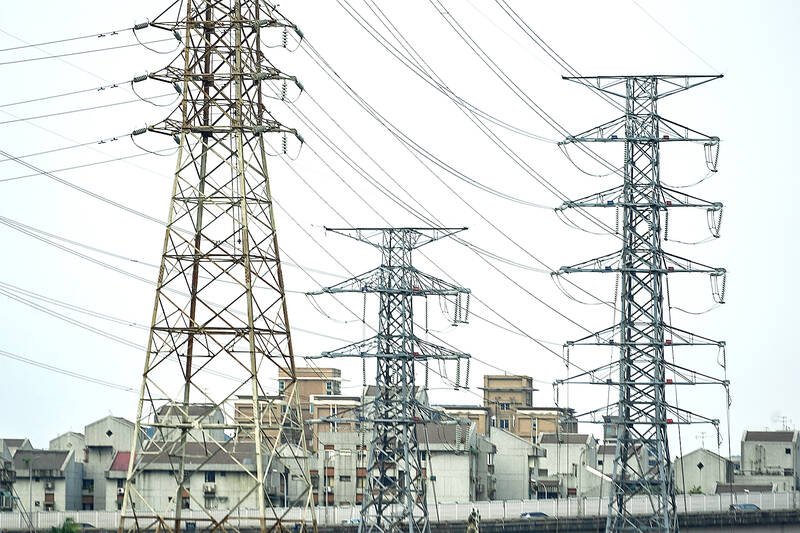Electricity use among the nation’s heavy users last month rebounded 3.35 percent from a year earlier, the fastest growth in 29 months, driven by suppliers of electronics used in artificial intelligence (AI) and other emerging technology applications, the Taiwan Research Institute (台灣綜合研究院) said yesterday.
The latest data indicated that the Electricity Prosperity Index, which the New Taipei City-based research body uses to gauge the health of the industrial and service sectors, stayed “green,” or in a state of steady growth.
The institute is looking at a GDP growth of 4.3 percent for last month, judging by the robust electricity use and export orders.

Photo: CNA
Export orders, which foretell actual shipments by one to three months, last month expanded 10.8 percent from a year earlier, thanks to strong demand for AI chips from US technology giant Nvidia Corp, the Ministry of Economic Affairs said on Monday.
The AI boom would further benefit Taiwan’s export-oriented economy, as local semiconductor firms command global leadership positions in the chipmaking process, the institute said, adding that end-market demand for some non-technology products has also showed signs of normalization.
AI BOOM
Last month’s overall power consumption by the industrial and commercial sectors grew 2.78 percent year-on-year — with a 1.46 percent uptick for the entire manufacturing industry and a 3.35 percent gain among high-voltage users, it found.
Taiwan’s semiconductor firms are by far the largest users of electricity. Makers of PCs and optical devices also reported evident business improvement alongside chipmakers, the institute found.
Local computer brands are keen to take advantage of the AI boom and exhibit AI PCs at the Computex Taipei trade show from June 4 to 7.
Electricity used by makers of machinery equipment and plastic products appeared to have bottomed out, while it floundered for vendors of chemical and rubber products after China terminated favorable trade terms under the Economic Cooperation Framework Agreement, the institute said.
Electricity used by chemical product makers declined 1 percent year-on-year despite a low comparison base last year, it added.
BETTER BUSINESS
Things could improve this quarter, helped by the arrival of the high season and lingering shipping disruptions in the Red Sea that have pushed up selling prices, the institute said.
Power consumed by service providers posted a 9.02 percent spike, as consumer spending held steady, it said.
These positive twists would lend further support to the nation’s economic recovery for the rest of this year, it added.

The Eurovision Song Contest has seen a surge in punter interest at the bookmakers, becoming a major betting event, experts said ahead of last night’s giant glamfest in Basel. “Eurovision has quietly become one of the biggest betting events of the year,” said Tomi Huttunen, senior manager of the Online Computer Finland (OCS) betting and casino platform. Betting sites have long been used to gauge which way voters might be leaning ahead of the world’s biggest televised live music event. However, bookmakers highlight a huge increase in engagement in recent years — and this year in particular. “We’ve already passed 2023’s total activity and

Nvidia Corp CEO Jensen Huang (黃仁勳) today announced that his company has selected "Beitou Shilin" in Taipei for its new Taiwan office, called Nvidia Constellation, putting an end to months of speculation. Industry sources have said that the tech giant has been eyeing the Beitou Shilin Science Park as the site of its new overseas headquarters, and speculated that the new headquarters would be built on two plots of land designated as "T17" and "T18," which span 3.89 hectares in the park. "I think it's time for us to reveal one of the largest products we've ever built," Huang said near the

China yesterday announced anti-dumping duties as high as 74.9 percent on imports of polyoxymethylene (POM) copolymers, a type of engineering plastic, from Taiwan, the US, the EU and Japan. The Chinese Ministry of Commerce’s findings conclude a probe launched in May last year, shortly after the US sharply increased tariffs on Chinese electric vehicles, computer chips and other imports. POM copolymers can partially replace metals such as copper and zinc, and have various applications, including in auto parts, electronics and medical equipment, the Chinese ministry has said. In January, it said initial investigations had determined that dumping was taking place, and implemented preliminary

Intel Corp yesterday reinforced its determination to strengthen its partnerships with Taiwan’s ecosystem partners including original-electronic-manufacturing (OEM) companies such as Hon Hai Precision Industry Co (鴻海精密) and chipmaker United Microelectronics Corp (UMC, 聯電). “Tonight marks a new beginning. We renew our new partnership with Taiwan ecosystem,” Intel new chief executive officer Tan Lip-bu (陳立武) said at a dinner with representatives from the company’s local partners, celebrating the 40th anniversary of the US chip giant’s presence in Taiwan. Tan took the reins at Intel six weeks ago aiming to reform the chipmaker and revive its past glory. This is the first time Tan